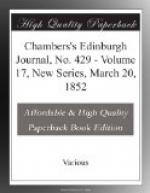The eighth advantage is social, inasmuch as it brings men of different degrees together, and promotes their intimacy and friendship; and ’advantage the ninth, is in wisdom and knowledge, and that wise men do play chess; and to those who object that foolish men also play chess, and, though constantly engaged in it, become no wiser, it may be answered, that the distinction between wise and foolish men in playing chess, is as that of man and beast in eating of the tree—that the man chooses its ripe and sweet fruit, while the beast eats but the leaves and branches, and the unripe and bitter fruit; and so it is with players at chess—the wise man plays for those virtues and advantages which have been already mentioned, and the foolish man plays it but for mere sport and gambling, and regards not its advantages and virtues. This is the condition of the wise man and foolish man in playing chess.’ From this it seems a descent to the tenth advantage, which is, that chess combines war with sport; and pleasant allegories are made subservient to the inculcation of sound truths and important principles.
Next comes an explanation of the mode in which Great Chess was played, with the nature and value of the various moves. Among the hard technicalities with which it abounds, the writer takes occasion to condemn the practice of giving a different value to the piece which may have reached the end of the board; ‘for,’ as he says, ’what is more natural or just than that men should occupy the station of their predecessors, and that the son of a king should become a king, and a general’s son attain the rank of a general.’ An instance of rigid caste-law carried into a harmless recreation.
In another manuscript, chess is shewn to have something to do with a man’s fortunes: he who could watch a game without speaking, was held to be discreet, and qualified for a government office. And conquerors are enjoined not to boast of their success; not to say, even if such be the case, that they have won all the games, but that they have ’won some.’ Exemplary virtue is not, however, claimed for chess-players, as in the former instance, for some are said to be continually ’swearing false oaths, and making many vain excuses;’ and again, ’You never see a chess-player rich, who is not a sordid miser,




